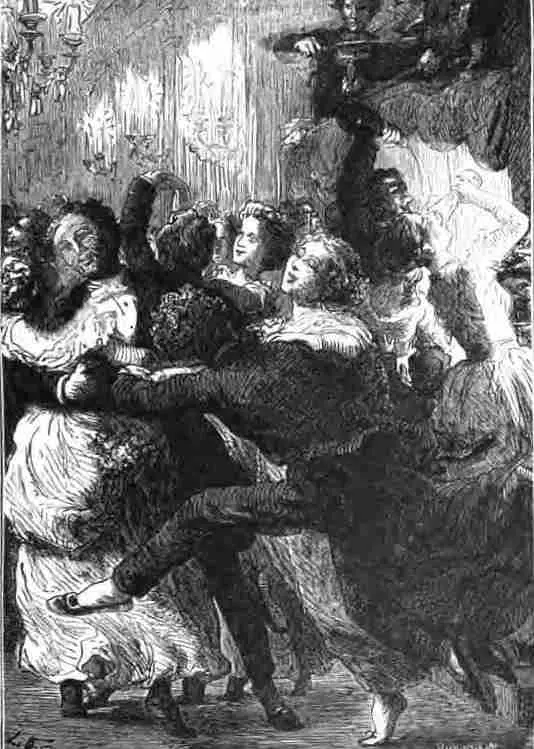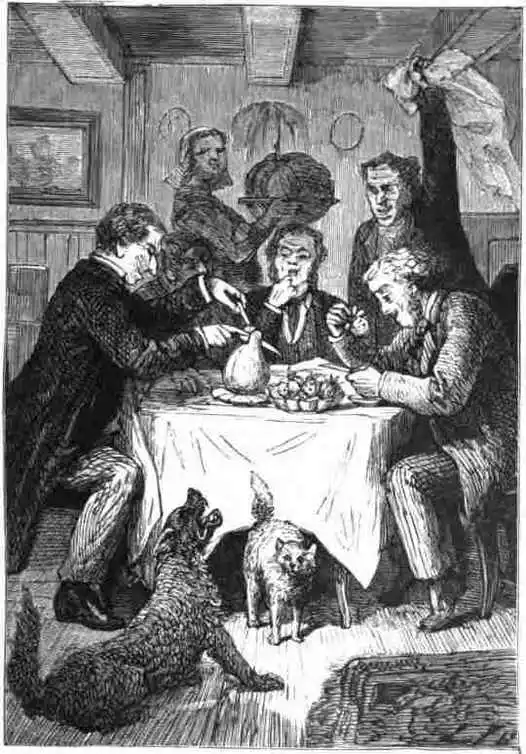Why, then, on this evening at Collaert the banker's, did the syrups seem to be transformed into heady wines, into sparkling champagne, into heating punches? Why, towards the middle of the evening, did a sort of mysterious intoxication take possession of the guests? Why did the minuet become a jig? Why did the orchestra hurry with its harmonies? Why did the candles, just as at the theatre, burn with unwonted refulgence? What electric current invaded the banker's drawing-rooms? How happened it that the couples held each other so closely, and clasped each other's hands so convulsively, that the "cavaliers seuls" made themselves conspicuous by certain extraordinary steps in that figure usually so grave, so solemn, so majestic, so very proper?
Alas! what OEdipus could have answered these unsolvable questions? Commissary Passauf, who was present at the party, saw the storm coming distinctly, but he could not control it or fly from it, and he felt a kind of intoxication entering his own brain. All his physical and emotional faculties increased in intensity. He was seen, several times, to throw himself upon the confectionery and devour the dishes, as if he had just broken a long fast.
The animation of the ball was increasing all this while. A long murmur, like a dull buzzing, escaped from all breasts. They danced--really danced. The feet were agitated by increasing frenzy. The faces became as purple as those of Silenus. The eyes shone like carbuncles. The general fermentation rose to the highest pitch.
And when the orchestra thundered out the waltz in "Der Freyschütz,"--when this waltz, so German, and with a movement so slow, was attacked with wild arms by the musicians,--ah! it was no longer a waltz, but an insensate whirlwind, a giddy rotation, a gyration worthy of being led by some Mephistopheles, beating the measure with a firebrand! Then a galop, an infernal galop, which lasted an hour without any one being able to stop it, whirled off, in its windings, across the halls, the drawing-rooms, the antechambers, by the staircases, from the cellar to the garret of the opulent mansion, the young men and young girls, the fathers and mothers, people of every age, of every weight, of both sexes; Collaert, the fat banker, and Madame Collaert, and the counsellors, and the magistrates, and the chief justice, and Niklausse, and Madame Van Tricasse, and the Burgomaster Van Tricasse, and the Commissary Passauf himself, who never could recall afterwards who had been his partner on that terrible evening.

it was no longer a waltz
But she did not forget! And ever since that day she has seen in her dreams the fiery commissary, enfolding her in an impassioned embrace! And "she"--was the amiable Tatanémance!
CHAPTER IX.
IN WHICH DOCTOR OX AND YGÈNE, HIS ASSISTANT, SAY A FEW WORDS.
"Well, Ygène?"
"Well, master, all is ready. The laying of the pipes is finished."
"At last! Now, then, we are going to operate on a large scale, on the masses!"
CHAPTER X.
IN WHICH IT WILL BE SEEN THAT THE EPIDEMIC INVADES THE ENTIRE TOWN, AND WHAT EFFECT IT PRODUCES.
During the following months the evil, in place of subsiding, became more extended. From private houses the epidemic spread into the streets. The town of Quiquendone was no longer to be recognized.
A phenomenon yet stranger than those which had already happened, now appeared; not only the animal kingdom, but the vegetable kingdom itself, became subject to the mysterious influence.
According to the ordinary course of things, epidemics are special in their operation. Those which attack humanity spare the animals, and those which attack the animals spare the vegetables. A horse was never inflicted with smallpox, nor a man with the cattle-plague, nor do sheep suffer from the potato-rot. But here all the laws of nature seemed to be overturned. Not only were the character, temperament, and ideas of the townsfolk changed, but the domestic animals--dogs and cats, horses and cows, asses and goats--suffered from this epidemic influence, as if their habitual equilibrium had been changed. The plants themselves were infected by a similar strange metamorphosis.
In the gardens and vegetable patches and orchards very curious symptoms manifested themselves. Climbing plants climbed more audaciously. Tufted plants became more tufted than ever. Shrubs became trees. Cereals, scarcely sown, showed their little green heads, and gained, in the same length of time, as much in inches as formerly, under the most favourable circumstances, they had gained in fractions. Asparagus attained the height of several feet; the artichokes swelled to the size of melons, the melons to the size of pumpkins, the pumpkins to the size of gourds, the gourds to the size of the belfry bell, which measured, in truth, nine feet in diameter. The cabbages were bushes, and the mushrooms umbrellas.
The fruits did not lag behind the vegetables. It required two persons to eat a strawberry, and four to consume a pear. The grapes also attained the enormous proportions of those so well depicted by Poussin in his "Return of the Envoys to the Promised Land."

It required two persons to eat a strawberry
It was the same with the flowers: immense violets spread the most penetrating perfumes through the air; exaggerated roses shone with the brightest colours; lilies formed, in a few days, impenetrable copses; geraniums, daisies, camelias, rhododendrons, invaded the garden walks, and stifled each other. And the tulips,--those dear liliaceous plants so dear to the Flemish heart, what emotion they must have caused to their zealous cultivators! The worthy Van Bistrom nearly fell over backwards, one day, on seeing in his garden an enormous "Tulipa gesneriana," a gigantic monster, whose cup afforded space to a nest for a whole family of robins!
The entire town flocked to see this floral phenomenon, and renamed it the "Tulipa quiquendonia".
But alas! if these plants, these fruits, these flowers, grew visibly to the naked eye, if all the vegetables insisted on assuming colossal proportions, if the brilliancy of their colours and perfume intoxicated the smell and the sight, they quickly withered. The air which they absorbed rapidly exhausted them, and they soon died, faded, and dried up.
Such was the fate of the famous tulip, which, after several days of splendour, became emaciated, and fell lifeless.
It was soon the same with the domestic animals, from the house-dog to the stable pig, from the canary in its cage to the turkey of the back-court. It must be said that in ordinary times these animals were not less phlegmatic than their masters. The dogs and cats vegetated rather than lived. They never betrayed a wag of pleasure nor a snarl of wrath.
1 comment